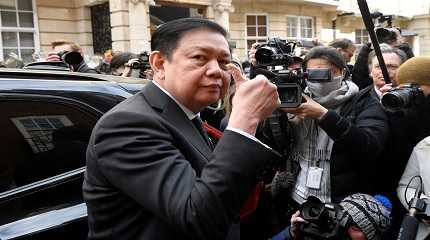
LONDON, March 10 (Reuters) - Britain has urged Myanmar's former ambassador to leave the official London residence where he has continued to live since he was ousted for criticising last year's military coup, citing pressure from the junta, according to emails seen by Reuters.
Kyaw Zwar Minn was locked out of his embassy last April by his own staff after calling for the release of Myanmar's civilian leader Aung San Suu Kyi, detained alongside most of her government in the Feb. 1 coup.
The coup sparked international outrage, sanctions against Myanmar's military, including from Britain, and a mass uprising in which hundreds have been killed.
Since his ouster, Kyaw Zwar Minn has stayed at the northwest London residence, a mansion surrounded by razor wire and CCTV cameras, refusing to hand it back to the embassy which he says is now run by representatives of an illegitimate government.
"We are under considerable pressure from the military regime to resolve the issue of your continued presence in the Myanmar Residence," a senior foreign office official said in an email sent to Kyaw Zwar Minn on March 4.
The correspondence, which dates back to October last year, repeatedly urges Kyaw Zwar Minn to leave the house, saying his presence there poses legal problems for Britain and risks to its staff in Myanmar.
Britain's Foreign Office did not directly answer questions on the correspondence. A spokesperson for the ministry said Kyaw Zwar Minn took a "brave stand in support of democracy" and that Britain had provided "significant support" to him to build a life for his family in the UK.
Kyaw Zwar Minn, who was Myanmar's ambassador to London for around seven years, declined to comment on the email exchange but told Reuters he would not leave the house until Suu Kyi was released or a legitimate Myanmar government was established and recognised by the UK.
Myanmar's junta did not respond to a request for comment.
The battle over the house has "huge diplomatic significance" as Myanmar's junta seeks international recognition, a rights group said.
"It (the house) belongs to the people of Myanmar ... not the illegal junta whose failed coup is destroying the country," said Chris Gunness, director of the Myanmar Accountability Project.
"LEGAL DIFFICULTIES"
Britain is among several Western countries that have called for democracy to be restored in Myanmar and sanctioned members of Myanmar's military and some of its business interests.
Deposed Myanmar politicians who escaped arrest after the coup, and other pro-democracy allies, formed the National Unity Government (NUG), a parallel administration aligned with Suu Kyi.
Most democratic nations, including Britain, have not formally recognised either the NUG or the junta.
In July last year, Myanmar's junta appointed a new temporary head of its London embassy and Britain appointed a new ambassador to Myanmar.
In October, Britain's foreign office wrote to Kyaw Zwar Minn saying his continued presence in the embassy-owned London residence was causing "significant legal difficulties" for Britain. It did not specify the difficulties.
"We do not think it is tenable for you to remain there," the foreign office said.
Kyaw Zwar Minn replied that he would only hand over the property "to the legitimate, elected government of Myanmar, not to the military".
In another exchange in late February, more than a year after the coup, Kyaw Zwar Minn said he would not move out until Suu Kyi, who is facing decades in prison on multiple charges brought by the junta, was released and a "legitimate" government formed.
Alternatively, he said, he would hand it over to the NUG if that government was recognised by the UK. The NUG did not immediately respond to a request for comment.




